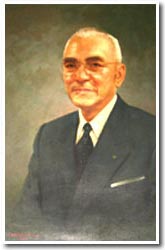The Manila Law College (or the former Escuela de Derecho de Manila) has a formidable list of alumni. We boast of producing a former President, twelve (12) Supreme Court Justices, officers of the Judiciary, and an array of Local Government executives, legislators, educators, businessmen, artists, and revolutionaries.
To begin with, Escuela de Derecho de Manila could not had been conceived without the visionary leadership of Don Felipe de Calderon, the father of the Malolos Constitution.
As we celebrate 110 glorious years, we pay tribute to our marvelous, exemplary alumni:
Jose P. Laurel – President of the Republic of the Philippines (1943-1945); Associate Justice of the Supreme Court (1935-1941),; obtained his Master of Laws from Escuela de Derecho de Manila in 1918
Manuel V. Moran – Chief Justice of the Supreme Court (1945-1966); the Father of Remedial Law, first Philippine ambassador to Spain and the Vatican, LlB 1913

Felix Angelo Bautista – Associate Justice of the Supreme Court (1950-1956), First Dean of the Manila Law College
Manuel Briones – Associate Justice of the Supreme Court
Norberto Romualdez – Associate Justice of the Supreme Court (1921-1932)
Anacleto Diaz – Associate Justice of the Supreme Court (1933-1941)
Antonio Horilleno – Associate Justice of the Supreme Court (1940-1945)
Carlos Imperial – Associate Justice of the Supreme Court (1931)
Guillermo Pablo – Associate Justice of the Supreme Court (1945-1955)
Luis Torres – Associate Justice of the Supreme Court (1949-1950); Secretary of Justice
Jose Gutierrez David – Associate Justice of the Supreme Court (1959-1961)
Felix Martinez – Associate Justice of the Court of Appeals
Domingo Laperal – Associate Justice of the Court of Appeals
Gloria Conti Paras – Associate Justice of the Court of Appeals
Concepcion Felix-Calderon – founder, Assocacion Feminista de Filipinas
Francisco Zulueta – Senator, 1931-1934
Jose Clarin – Senator, 1916-1935
Jose O. Vera – Senator, 1922-1935
Emiliano Trias Tirona – Senator, 1922-1928
Jose Imperial – Senator
Jose Altavas – Senator, 1916-1922
Mariano Jesus Cuenco – Senator, 1941-1965; Cebu Governor, 1931-1934
Vicente Rama – Senator, 1922-1935; Father of Cebu Charter
Pedro Canu Hernaez – Senator, 1941-1947; Father of Bacolod
Pablo Angeles David – Senator, 1947-1953; Pampanga Governor
Vicente Singson Encarnacion – Senator, 1916-1925
Teofisto Guingona, Sr. – Senator, 1919-1925
Jose Clemente Zulueta – Senator, 1951-1957
Vicente J. Francisco – Senator, 1946-1951
Antero Soriano – Senator; Cavite Governor
Eligio Lagman - Pampanga Governor
Pedro Magsalin – Congressman
Leonardo Festin – Congressman
Mauro Versoza – Congressman
Fernando Veloso – Congressman
Marcelino Veloso – Congressman
Pablo Ocampo – Congressman
Jose Roño – Cabinet Secretary
Adolfo Brillantes – Congressman; Bar topnotcher, 1920
Agapito Cruz – Regional Trial Court Judge
Leonardo Cruz – Regional Trial Court Judge
David Nitafan – Regional Trial Court Judge
Andres Borromeo – Judge
Leon Guinto Sr. - Senate Secretary; Manila Mayor
Quintin Salas – Colonel
Jose Corazon de Jesus – Nationalist writer
Teodoro M. Kalaw - Director of National Museum; Secretary of Interior
Jose Escaler - industrialist
Oscar Castelo - Judge; Secretary of National Defense
Marcelo Balatbat - Budget Commissioner
Enrique Altavas - Commissioner
Enrico Palomar - Postmaster General
Rafael Corpuz - Business Executive
Pedro Ocampo - BUsiness Executive
Alfonso Encarnacion - Business Executive
Jose Gatchalian - Business Executive
Benjamin Bautista - Business Executive
Angel dela Paz - Banker
Homer delos Reyes - Banker
Romeo Echauz - Insurance Bank Executive
Flavio Zaragosa Cano - Hiligaynon poet; Bicol Labor Leader (Law undergraduate)
Antonio Molina - National Artist (Law undergraduate)
Carlos Ronquillo - Revolutionary leader (Law undergraduate)
Sergio Canlas Navarro – Kapampangan writer (Law undergraduate
Michaelina Ramos Balasbas - Law firm partner
Roster of Deans:
01 – Dean Felipe G. Calderon
02 – Dean Rafael V. Palma
03 – Dean Teodoro M. Kalaw
04 – Dean Quintin Paredes
05 – Dean Emiliano Tria Tirona
06 – Dean Jose B. Abad Santos
07 – Dean Felix Angelo Bautista
08 – Dean Manuel Camus
09 – Dean Perfecto Laguio
10 – Dean Pablo Meer
11 – Dean Edgardo L. Paras
12 – Dean Enrique Galang
13 – Dean Porfirio V. Sison
14 – Dean Benjamin B. Domingo
